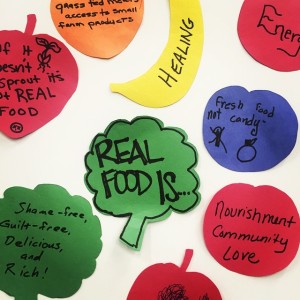We know the general importance of eating a variety of fruits and vegetables and clean, lean meats for our family’s well-being, but do we know the details? How does zinc really work in the body? What is phosphatidyl choline and where do I find some?
I would like to share the 10 key nutrients that are helpful for thinking/ scholastic performance, concentration and memory and the foods that carry them. Plus, I would like to address one of the most important pieces for all of these key nutrients to work and that is a good night’s sleep. Before we dive in, I would like to discuss the importance of organic.
The biggest reason for organics, other than not wanting to ingest any pesticide/ herbicide, is the active ingredient glyphosate. Glyphosate is the active ingredient in the #1 herbicide spray Round Up. It’s not only used on lawns to kill everything in sight but it’s sprayed on 90% of our soy, wheat, corn, and sugar beets. It’s also fed to our meat supply. The process by which glyphosate operates is to starve the weed of its minerals by  binding the minerals in the soil and preventing them from moving into the plant. This process is referred to as mineral chelation. This chemical is fast absorbing and slow degradation. What we spray today will reside in our soil for up to 20 years. This translates to a severe loss of soil minerals which then depletes minerals in our produce and animal protein. When we ingest glyphosate, it performs the same task within our digestion, leaving us mineral depleted.
binding the minerals in the soil and preventing them from moving into the plant. This process is referred to as mineral chelation. This chemical is fast absorbing and slow degradation. What we spray today will reside in our soil for up to 20 years. This translates to a severe loss of soil minerals which then depletes minerals in our produce and animal protein. When we ingest glyphosate, it performs the same task within our digestion, leaving us mineral depleted.
Let’s get back to the nutrients!
• Zinc – important for fast cognition and sustained attention http://www.ncbi.nlm.nih.gov/pubmed/11509102
• B vitamins (B1,B6,B12, folate) – boosts I.Q. and improves speed of thinking http://lpi.oregonstate.edu/ss11/cognitive.html
• Omega-3 fatty acids (EPA, DHA, GLA) – improve emotional intelligence and behavior and is considered “food for the brain” http://www.ncbi.nlm.nih.gov/pubmed/18072818
• Phosphatidyl choline – for memory and mental function; used to make acetylcholine as well as B1.B5, B12, and C) http://www.lef.org/Magazine/2011/1/Feed-Your-Brain/Page-01
• Phosphatidyl serine– also for memory; used as a “docking port” on neurons where neurotransmitters latch on to deliver messages. http://216.194.92.128/pdf3/Omega3s.pdf
• DMAE – makes acetylcholine; reduces anxiety, stops racing mind, improves concentration, promotes learning and may mildly stimulate the brain; enhances memory http://www.lef.org/Magazine/2004/11/aas/Page-01
• Glutamine – fuel for the brain; enhances mood and mental performance http://neurogenesis.com/amino-acids/glutamine/
• Pyroglutamate – enhances learning by boosting acetylcholine production; boosts receptor sites and improves communication between both hemispheres of the brain.
• Vitamin A – improves eyesight which improves hand/ eye coordination and reading skills http://www.drweil.com/drw/u/ART02759/facts-about-vitamin-a
• GABA – neurotransmitter made from amino acid glutamine; helps forge the link between memories and calms down an overexcited nervous system http://neurogenesis.com/amino-acids/glutamine/
Foods that Supply These Nutrients
When thinking about what foods to consume that are rich in these nutrients, I had to think like a child. Even though oysters are the best source for zinc, is little Johnny going to belly up to the bar and scarf down some raw oysters with a shot of hot sauce? Probably not, so I’m going to keep it as easy and cost effective as possible. A lot of these foods combine several key nutrients so even better! (Just to reiterate: your best bet to make sure your meats contain a healthy amount of these nutrients is to consume pastured grass-fed beef and chicken and wild-caught fish. Any other source will have minimal to none of these nutrients). Another note: No need to purchase supplements for these nutrients if you are consuming a variety of these foods listed. Supplementation has its place but if you are generally healthy, food should suffice and more is not always better!
Zinc: pumpkin seeds, pecans, Brazil nuts, oats, lima beans, buckwheat, hazelnuts, almonds, and gingerroot.
B Vitamins: brown rice, dark green leafy vegetables, pecans, almonds, chicken, fish, eggs, beef, bananas, cabbage
Omega- 3 fatty acids (EPA/DHA): cold water fish such as wild caught salmon, sardines, anchovy, flax seeds, chia seeds
Phosphatidyl choline: salmon, eggs, beef and milk (low fat milk defeats getting PC. Organic whole is where it’s at)
Phosphatidyl serine: white beans and soybeans (fermented soy is even better such as tempeh and tofu), milk, and eggs
DMAE: salmon, anchovies, and sardines
Glutamine: your body makes glutamine (non-essential amino acid) but certain situations can deplete it so outside sources include, beans, cottage cheese (grass fed), parsley, and cabbage
Pyroglutamate: found in meats, fruits, vegetables
Vitamin A: carrots, dried apricots, kale, sweet potatoes, parsley, spinach, mangoes, cantaloupe, and broccoli
GABA: green tea and fermented foods such as yogurt, sauerkraut, kimchi (my kids like fermented pickle and cabbage shreds on their burgers. They have no idea its cabbage)
Last, but most important to our children, is a good night’s sleep. I know from experience it’s much easier for me to tell you the importance of sleep than actually making this happen. Sleep is vital for all of these nutrients to work. Our bodies need that time to regenerate and heal from the day’s depletion of resources. Here is a list of nutrients and foods that will promote good sleep:
Calcium and magnesium- dark leafy greens, seeds, nut milks
Reduce/ eliminate sugar consumption
B vitamins- brown rice, lentils, beans
Tryptophan- chicken, cheese, eggs
Melatonin- brown rice, oats, bananas
Beyond food, a good routine also helps. Make sure your child gets plenty of sunshine and fresh air daily, electronics removed one hour before bedtime, soothing bathing routine, reading (to or on their own), darkened room and if a little lavender helps, you can add this to the bed sheets!
Courtney Ellis, CNTP, MNT is a holistic Nutrition Therapist in Denver, Colorado. Her practice focuses on getting to the root cause of symptoms and educates clients on nutrition therapies specific to his/her individualized needs. In her free time, Courtney enjoys the Colorado outdoors with her husband and two children. She is also currently building her practice and website, in the meantime, she can be reached at Root Functional Nutrition (303) 895-8589. If she doesn’t answer right away she might be with a client or she could be off on a run, or hula hooping her little heart out!




